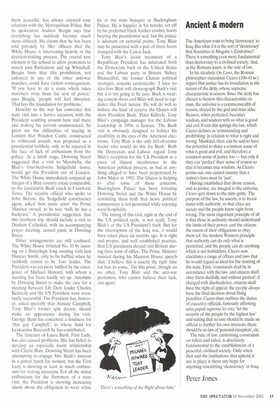Ancient & modern
The Americans want to bring 'democracy' to Iraq. But what if it is the sort of 'democracy' that flourishes in Mugabe's Zimbabwe? There is something even more fundamental than democracy to a civilised society: that, as the Romans knew, is the rule of law.
In his idealistic On Laws, the Roman philosopher-statesman Cicero (10643 BO argues that justice has its foundation in the nature of the deity, whose supreme characteristic is reason, Since the deity has chosen to bestow this characteristic on man, the universe is a commonwealth of reason, shared by the god and man alike. Reason, when perfected, becomes wisdom, and wisdom tells us what is good and evil. From this springs the law, which Cicero defines as 'commanding and prohibiting' in relation to what is right and wrong. Mankind, then, can be said to have the potential to share a common sense of what is good and evil, and therefore a common sense of justice too but only if they can 'perfect' their sense of reason so that it becomes true wisdom. As Cicero points out, one cannot assume that a nation's laws must be 'just'.
Having established that divine reason, and so justice, are integral to the universe, Cicero gets down to the nitty-gritty. The purpose of the law, he asserts, is to invest states with authority, so that cities are secure and the people know right from wrong. The most important principle of all is that those in authority should understand the limits of their power, and the citizens the extent of their obligations to obey them (cf. the modem Western principle that authority can do only what is permitted, and the people can do anything which is not forbidden). Cicero now elucidates a range of offices and laws that he would regard as ideal for the running of the state. First, 'commands shall be in accordance with the law, and citizens shall obey them dutifully and without protest'; if charged with disobedience, citizens shall have the right of appeal; the people always have the final decision about fixing penalties. Cicero then outlines the duties of executive officials, famously affirming salus populi suprema lex esto, let the security of the people be the highest law' and stating that no one should be made an official to further his own interests; there should be no law of 'personal exception', etc.
The rule of law, enshrining constraints on rulers and ruled, is absolutely fundamental to the establishment of a peaceful, civilised society. Only when that and the institutions that uphold it are in place is there any hope for anything resembling 'democracy' in Iraq.


























































































 Previous page
Previous page